Change
Makers
Today’s UNCG undergrads have big dreams and rich ideals. They also want to change the world. Sound familiar?
By Mercer Bufter ’11 MA
Photography by Sean Norona ’13
A young woman in a cable-knit sweater, ripped jeans, and brown leather boots raises her phone and snaps a selfie before descending the EUC stairs. Another passes in black-and-white checkered Vans and a Nirvana T-shirt. Another wears pajama pants and Crocs, colorful closed-toed foam sandals. Some of these Crocs are decorated with Jibbitz, “shoe charms” styled as anything from a piece of fruit to the animated character SpongeBob Squarepants.
For UNCG undergraduates, 88% of whom are under 28 years old, there is no single way to dress. But if they love your outfit, they might say, “That’s a slay.”
They were children during the Great Recession of 2008. Their high school years were spent planning events that would be canceled due to the COVID-19 lockdowns of 2020-21. Now, they’re graduating into a workplace marked by the “Great Resignation” and a changing technological landscape.
Today’s 20-somethings are the inheritors of a world shaped by the Silent Generation, the Baby Boomers, Generation X, and Millennials. No wonder many of their ideals and dreams sound familiar. At the same time, as new alumna Grace Wall ’23 says, “There will always be shifts and changes. Every new generation is going to push back on something.”
Who are today’s UNCG students and how do they think about their education, their University, and their future?
UNCG LOOKS LIKE THE REAL WORLD
Since 1892, Spartan students’ lives, expectations, and challenges have changed. The University has grown with the times. Woman’s College alumnae will speak of daily life that was very different from today’s – explaining that the only electronic appliances on their halls were radios and record players. To make a call, students used phone kiosks in the residence halls. Local calls, one recalls, were a dime.
Today, students have 24-hour access to video calls, texts, and social media. They can listen to podcasts, stream movies, and play online games anywhere through their phones. They also continue to build personal and professional networks in person as well as online.
In some ways, UNCG’s 21st-century student body looks familiar. For example, the University’s legacy of expanding access to education for women is clear. Today 67% of Spartan students are women. In other ways, UNCG’s demographics reflect contemporary state and national trends, with more representation of students of color and LGBTQ+ students than in previous generations.
Alyssa Odom is studying public health and wants to eventually become a licensed clinical social worker. She says, “One of the main reasons I chose this school was because of the diversity. I could have gone to an HBCU (Historically Black College or University), but ultimately I wanted to go to a school that looks like the real world.”
HOMEGROWN STUDENTS
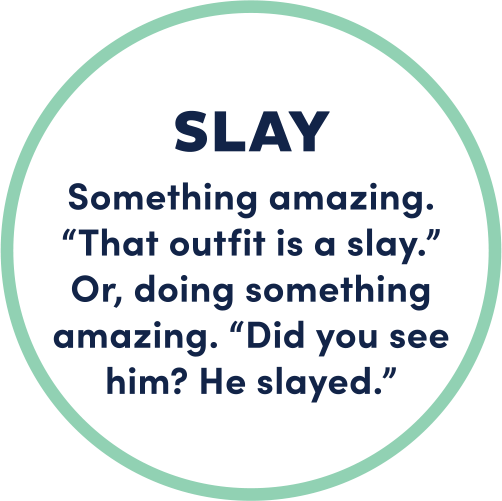
“Traditional” first-year students – 18-year-olds leaving home for the first time – represent only about 60% of each UNCG freshman class. Nearly 40% of each freshman class are students who’ve transferred from community colleges or other institutions.
In some key ways, transfer students parallel traditional freshmen. Similar proportions – over 50% – self-identify as first-generation college students. The ratio of women to men is virtually the same in both cohorts – about two-thirds women and one-third men.
The majority of UNCG students, over 91%, come from North Carolina, with almost half of out-of-state students coming from the Southeast and Mid-Atlantic regions. Virginia, Maryland, and South Carolina send the most out-of-state students to the University.
ECONOMIC HEADWINDS
According to the 1962-63 Woman’s College course catalog, in-state students could attend that year for $870, and that included laundry! According to the U.S. Bureau of Labor Statistics’ “inflation calculator,” that’s roughly $9,000 today.
But the reality is – college today costs around twice as much.
“It was easier to study whatever you wanted when school didn’t cost as much,” says Associate Vice Chancellor for Enrollment Management Joel Lee. “You didn’t have to worry about, ‘When I get out, my job needs to immediately pay me enough to pay off my student loan.’”

Couple this with the fact that 35% of UNCG undergraduates who file a FAFSA financial aid form expect a $0 contribution from their families, and the economic stress on today’s UNCG students is clear.
“I always grew up wanting to go to college, and I already have college debt. It’s stressful. I live alone, pay rent, and work three jobs right now,” says Claudia Stakoe, a student in Women’s, Gender, and Sexuality Studies who would like to work in public history. “None of my close friends are in college, and they still live at home because they can’t afford college.”
Her story is borne out by the numbers. According to the 2023 iBelong study, a survey of UNCG students, more than three-quarters work on or off campus and more than one-third work more than 30 hours per week.
For those who came of age during the 2010s, economic insecurity taught some hard lessons. “This generation felt the effects very viscerally in a way that was completely beyond their control in the Great Recession,” says Director of Student Health Services for Counseling and Psychological Services Jennifer Whitney. “That impacted their families during times in which they were very malleable in understanding the world and their safety.”
In addition to work, many students have family commitments. “I think people might be surprised to learn how much our students are juggling,” says Vice Chancellor for Student Affairs Cathy Akens.
And yet, many Gen Z students still choose to attend the University. Director of Admissions Erin Slater explains: “We’ve been seeing it more since the pandemic – essentially it’s ‘Why do I need to pay this amount for a college education when I can go and work?’ Well, it’s because you change the generational wealth of your family.”
GEN Z SURVIVED COVID, VIRTUALLY
According to Dr. Rebecca Adams, a sociologist in the School of Health and Human Sciences and self-avowed Baby Boomer, a “generation” is something more than cell phones, AirPods, and T-shirts. It has a sociological definition.
A generation is a group influenced by common events, Adams explains. At the same time, individuals react differently to those events. “You can have a Baby Boomer who volunteered to go to the Vietnam War and you can have another who was a protestor,” she says. “The fact that they have different political opinions is expected. It’s just that they were both marked by that same event, the Vietnam War.”
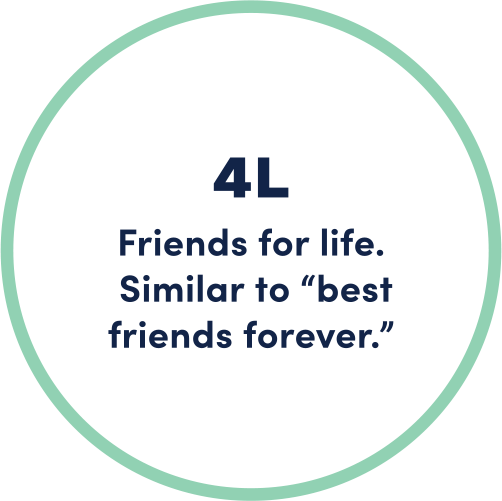
Adams says that Gen Z has been marked by COVID and by the social justice movements of the 2010s. Another common life experience that makes Gen Z different is that they are “digital natives.”
“Every couple of years there was a new social media outlet that my generation immersed ourselves in,” says Hannah Bond, who studies social media marketing.
In 1996, when the oldest Gen Z students were born, the internet was young. They would have been toddlers when Google was founded and only 6 years old when Facebook launched. Instagram was created during their adolescence, and TikTok caught fire around the time they entered college.
Then, in an age saturated with social media, the COVID pandemic hit. Gen Z was forced to socialize online at a time when physical isolation was necessary.
“I feel like that is when we delved into social media,” says Odom, who was a high school senior in Spring 2020. ”That’s when the whole TikTok thing happened, and I used FaceTime to talk to my friends.”
“I was actually one of those people who would make an account and never use it, pre-pandemic,” says Wall. “Post-pandemic, I needed those accounts to stay in touch with people I cared about.”
Growing up with social media comes with some well-known obstacles. “There are downsides, especially in terms of body image and confidence,” says Stakoe, who notes that some online content can make viewers feel insecure.
Bond agrees. “You compare yourself to the ‘perfect’ images that pop media calls an ‘ideal’ woman.” She adds that social media can also be used for online bullying.
Dr. Whitney, whose research focuses on disordered eating, says that while threats to self-image are real, today’s students are acutely aware of these forces.
“I think this generation is completely attuned to health and wellness in a way that previous generations have not been,” she says. “The awareness of fatphobia and how that connects to disordered eating and eating disorders is something that previously I would have to introduce and explain.” Today, students are coming to her ready to analyze these social forces. Social media is not all good or all bad, adds Whitney.
MENTAL HEALTH IRL (IN REAL LIFE)
According to the Healthy Minds Survey (2022), 69% of UNCG students reported a diagnosis related to behavioral or mental health. In a Pew Research Center poll (2018), 70% of the nation’s teens aged 13-17 agreed that anxiety and depression were major problems among their peers. In a blog post, the Annie E. Casey Foundation cited factors such as school shootings, joblessness, and the “fear of missing out” some social media platforms can cause.
Today’s students came of age in a world of challenges. “A lot of us grew up hearing about acts of terrorism every September and doing active shooter drills in school,” says Wall. In addition to economic challenges, health concerns, and global environmental threats, she says, “We’re going through a lot!”
On the 2023 iBelong survey, three-quarters of respondents “agreed” or “strongly agreed” that they feel “isolated.” Among first-generation UNCG students, this number is slightly higher, at 77%.
Personal issues related to social interaction and isolation are evident in many students, say mental health professionals. “Social media has increased social anxiety, and folks have lost some of the tools to navigate in-person social relationships,” explains Dr. Whitney, who notes a sharp increase in demand for counseling services.

The pandemic made an impact, too. Ayana Cholula – a resident advisor at the time – observed the difference in student life before and after the worst years of the pandemic. She says that when the mask mandates were lifted and students had more ability to socialize normally, the residence halls still felt empty.
“It was like, ‘Okay, why are the halls so quiet?’” she says. “There used to be nights when the entirety of Grogan Residential College would have a movie night downstairs or do a baking contest. And it was like, students don’t even walk into the common spaces – it’s like they’re not interested.”
Wall observed a similar struggle: “I was a resident advisor for the first semester when we were able to come back on campus. People were really struggling to make those connections that are so integral to a college experience.”
During 2023, students and staff have been learning what it means to return to a “normal” face-to-face world. At least on the surface, campus feels active again. This year began with 100% capacity in residence halls. With about 80% of first-year students living on campus, residence life and co-curricular activities have an important role to play in the UNCG experience.

Action!
The youngest child in a family of military personnel, police, and educators, Gabriel Yarborough had his sights set on professional acting from a young age

got talent? Pass it on
“I think of it as a Clark Kent/Superman situation. By day, I’m a psychologist and by night, I’m an actor,” says Melissa Lozada, a psychology major and musical theatre minor.
FROM MAINSTREAM TO “LIVE STREAM”
“We’re sometimes called the loneliest generation,” says Ivan Tarpley, a communication studies major. “But at the same time, we’re the most connected generation because of these different online platforms that we have.”
On platforms like Facebook, Instagram, or TikTok individuals post their own content and build their own audiences. This means that cable TV is less important to young consumers than in the past.

“The content on social media is created by the generation themselves,” says Gus Peña, director of the Office of Intercultural Engagement. “They’re able to self-author and critique and create what they share.”
Creating and sharing content on social media is an accessible way to make change. Often students and young people organize through online networks. “What we’re good at is getting back to grassroots stuff and helping people on a personal level,” says Stakoe. “I’m always seeing people supporting strangers, for example on GoFundMe pages.”
Slater says that Gen Z’s preference for regular people over paid messengers on social media affects the way the University communicates with prospective students. “They want to hear about college from a real person. Alumni are incredibly important to what we do in order to get our message across,” she says, noting that prospective students want to hear from people with firsthand experience.
Howard, who is a Spartan Orientation leader and student in the School of Education, agrees. She used brief TikTok videos as part of her campaign to become Homecoming Royalty in 2022 and believes social media is the best way to get prospective students’ attention. “If I was in high school and I saw UNCG doing social media with real students – actually a normal person like me – I would like it more,” she says.
SEEKING BALANCE

“I don’t think we get enough credit for being changemakers. Something that I’ve heard a lot from my parents’ generation is ‘No one wants to work these days.’ That’s just not true,” says Tarpley.
Whitney believes there is nuance to the relationship between work ethic and personal goals. “Gen Z is aware of the need to be financially stable, but quality of life is significantly prioritized for this generation.” This means today’s graduating Spartans may have career expectations different from their parents’ or grandparents.’
Carter, who has worked with students in many capacities over nearly three decades at the University, acknowledges that much has changed in the world of work. “With technology and innovation and creativity, the traditional 40-hour work schedules are no longer automatic.”
Some students see value in embracing both changing social standards and tried-and-true practices.
Cholula, who is working on a Master of Education degree, observes undergraduates building professional networks early in their academic careers. “I have seen so many people who are in their freshman year and they’re already posting on LinkedIn every day.”
She also argues that appearances and habits are not the same thing. “You can be a professional and have face piercings.”
Bond notes that some things in the world of work have not changed. “A lot of it is still all about networking, which I will preach to the heavens about! Networking, networking, networking!”
IT TAKES A VILLAGE
Lee says that students’ expectations – and needs – have changed.
“Gen Z may have as many life skills as previous generations, but those life skills might be different,” he says. “When I went to college, I didn’t expect anybody to check on me. I don’t think that’s the expectation for the current generation. I think they’re expecting help with all walks of life.”
As Carter puts it, “We’re using the old adage, ‘It takes a village.’”
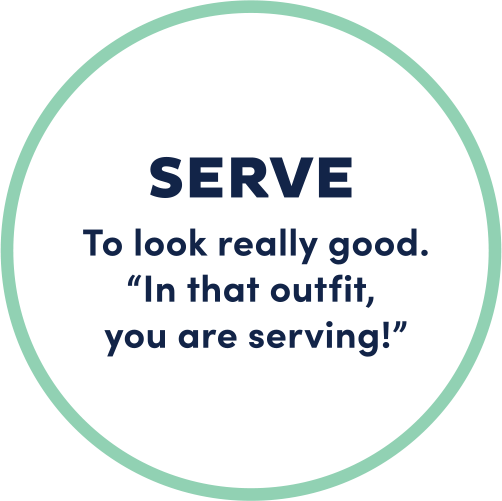
This means that today’s UNCG students have a different relationship with the University than Millennials, Gen Xers, or Baby Boomers did. Knowing this, UNCG faculty and staff mentors in Student Services, Counseling, the Office of Intercultural Engagement, and other campus offices are trying to meet today’s Spartans where they are.
Students notice the attention. According to the 2023 iBelong survey of students, 70% of respondents “agree” or “strongly agree” that people at UNCG check in with them regularly to see if they need support.
They also believe UNCG is listening to them. Over 70% of respondents “agree” or “strongly agree” that the University takes survey results seriously. That’s a measure of trust at a time when many young people are skeptical of institutions in general.
“We talk about the Spartan family because that’s what it is,” says Director of Enrollment Communications Katie MacInnes. “Students are coming here to spend four years of their lives. I mean, it’s your home, so it needs to feel like a family.”
DIFFICULT CONVERSATIONS
The story of mental health for Gen Z has two sides. In some ways, it’s an example of the contradictions today’s students live with.
Whitney says that asking for help is healthy. She sees Gen Z students as the inheritors of decades of increased mental health awareness. “A lot of times the story gets
told that students these days are not resilient. Well, we just spent the past 20 years telling folks: You should get help, you deserve help.”
Outside of a counseling setting, how do today’s students express the challenge of living in anxious times?
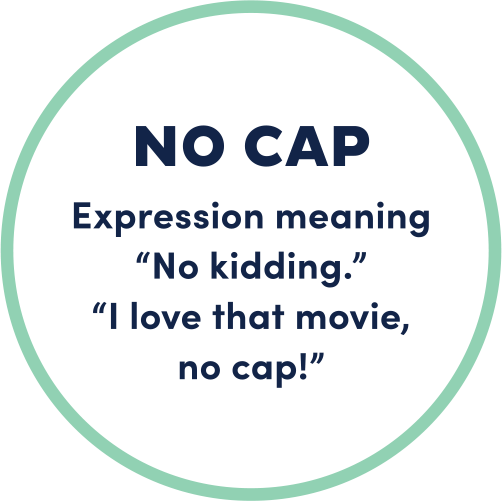
“You have people who are headstrong and are willing to just solve the issue at hand,” says Anthony Ascencio, a student in the Interior Architecture (IARc) Department. “But then on the other hand, you have people who are insecure and don’t want to take charge. We have these two ends of the spectrum, and I feel like I’ve fallen on both ends at different times.”
Melissa Lozada, a psychology major, says, “Sometimes Gen Z has the capacity to be morbid about the future. But the flip side of that coin is that we try to call out bad practices.”
Some students, like Victoria Howard, put this contradiction between reticence and action at the center of real opportunities to make change.
She says “difficult conversations” are key to growth. “They let you understand from a different perspective, which can be more beneficial than hurtful. There’s no more assuming. It should be conversations, not assuming,” she says.
Howard wants to bring this forthright attitude to her future work as a teacher. “My cohort of educators here, we actually want to make a difference in the world. We won’t sugarcoat anything for students because we want this next generation to succeed.”
GETTING AHEAD, TOGETHER
Today’s Spartans pursue a diverse set of career paths. That makes sense considering UNCG has excellent programs across disciplines, from humanities to STEM fields.
The top colleges in the University by enrollment (degree-seeking) are the College of Arts and Sciences (35%), the Bryan School of Business and Economics (24%), and the School of Health and Human Sciences (18%).
Today’s UNCG has the amenities of a large institution but the spirit of a close-knit campus, says Joel Lee. Academic options are just one part of this.
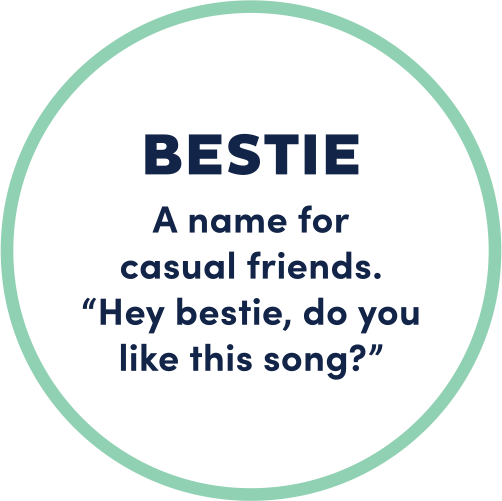
“We’ve got 17 Division I sports teams, an esports arena, and an award-winning dining hall, but UNCG has a personalized feel. As students walk across the campus, it’s easy for them to find a community and feel like they’re part of something,” he says.
That sense of belonging matters. In fact, for many Gen Z students, success is communal as well as individual.
“I think leadership is a collaborative process, and I don’t see it as one person having all of the answers for this big group of people, but rather they’re all working together,” says Tarpley. Often, they don’t want to succeed at the expense of another.
“I like to think this generation is a bit more united in terms of wanting to see ourselves succeed through having others succeed as well,” says Lozada. Dr. Adams connects a generational desire for social justice to movements like Black Lives Matter, which grew through the mid-2010s and received national attention in 2020.
Vice Chancellor Akens has also seen this in UNCG’s “driven, hardworking, and tenacious” students. “Despite their very busy lives, many students care deeply about others and the world around them. They want to have an impact and are willing to give their time to causes they feel passionately about.”
TAKING THE REINS
The majority of today’s UNCG students have lived their whole lives during the 21st century.
Much has changed professionally. Much has also changed in family relationships. While no single description of family relations applies to every individual, many Gen Z students have experienced a more informal relationship with elders than their parents or grandparents did.
“Relationships with their parents or caregivers are very much unlike the hierarchical relationships that existed in the generations before. I think there’s a real richness in those relationships,” says Dr. Whitney. “Some students call parents by their first names,” she notes.

Dr. Adams describes a warm and respectful relationship with today’s UNCG students. “They’re just more appreciative of interaction whether it’s face-to-face or via technology,” she says, adding that her Gen Z students specifically point out one-on-one meetings with her as something they value about their learning.
Informal but eager to connect, self-assured but seeking support, fluently online but prone to isolation: These contradictions are part of what make today’s young Spartans
so dynamic.
“If there are alumni who think Gen Z folks seem ‘foreign,’” says Whitney, “I would say life is the same, it’s just in a different frame. Go meet someone and have these awesome conversations that are intergenerational.”
Another way to put it? As Associate Vice Chancellor Carter says, “This is a group that’s going to be boisterous!”
Today’s UNCG Students
By the numbers
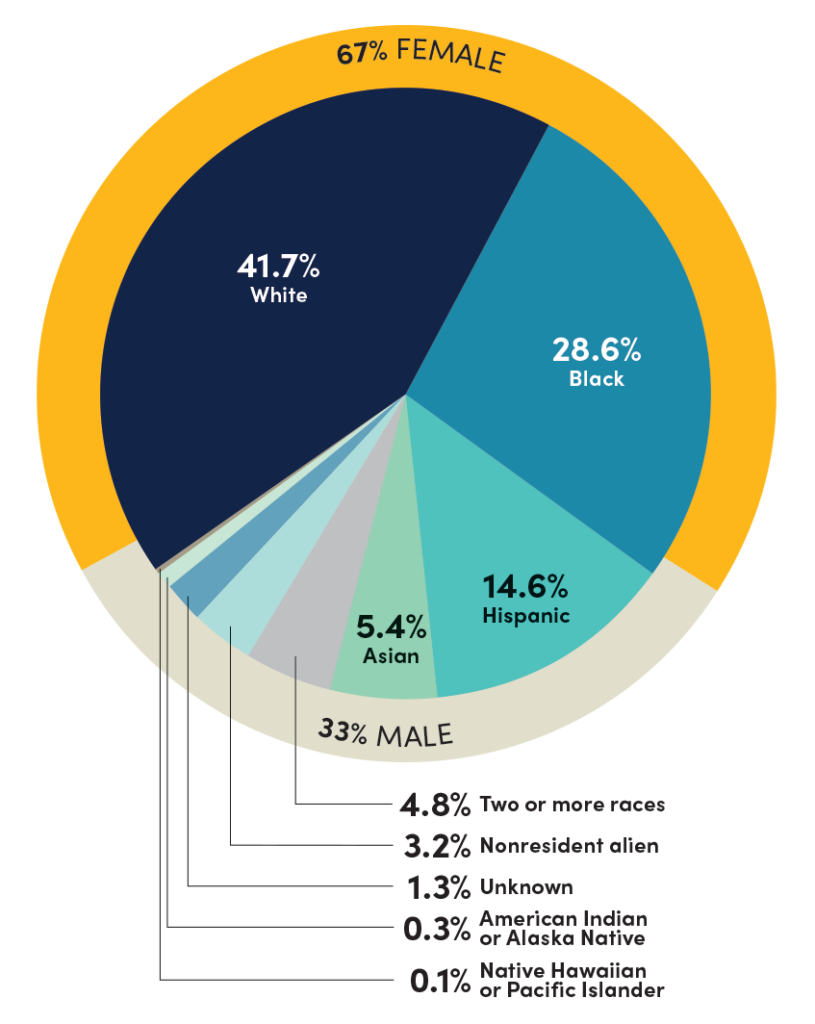
- 38% of each incoming class transfers from another institution.
- The average age of transfer students is 25.
- More than 1/3 undergraduates who submitted a FAFSA have an expected family contribution of $0.
- Over 70% of UNCG students take at least one online course and around 16% are enrolled in
- a fully online program.
- Nearly 3/4 of the overall undergraduate population receives some financial aid (includes loans).
- 88% of all undergraduates are younger than
- 28 and are therefore members of Gen Z.
Source: UNC System DataMart, Fall 2023 census snapshot
Who are today’s Spartans?

Anthony
Year: Senior
Major: Interior Architecture
Fun Fact: Has served on the executive board for the International Interior Design Association (IIDA) Campus Center since 2022. Loves “thrifting” and draws inspiration from Mexican design.
We find strength in numbers and really find comfort in each other. a big part of solving issues is Collaboration.
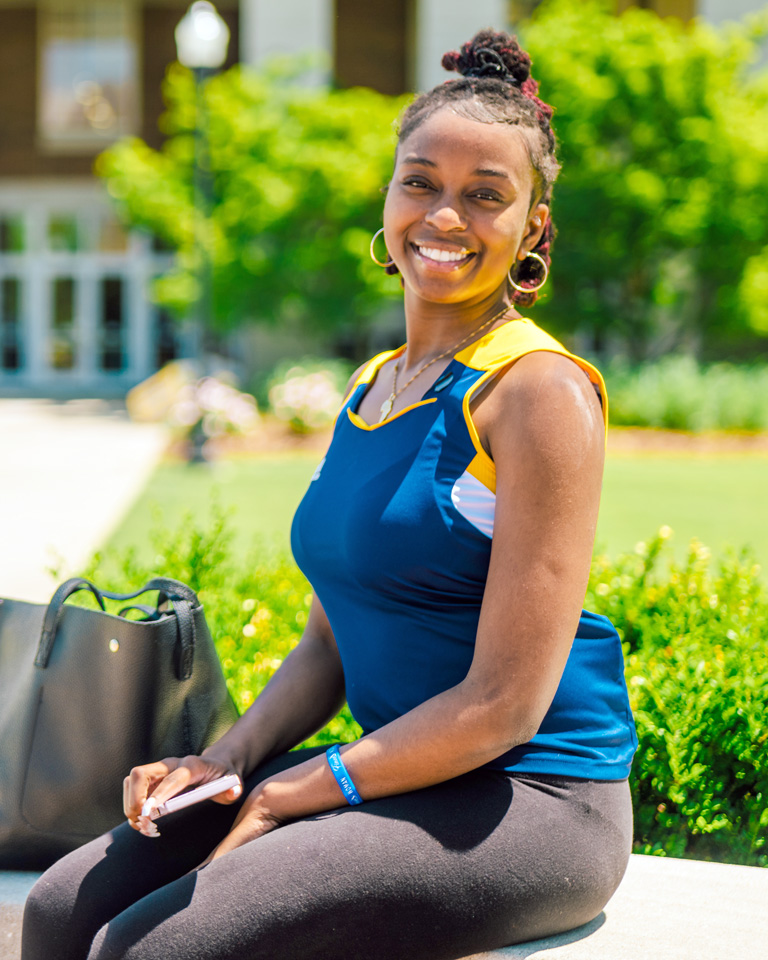
Victoria
Year: Senior
Major: Education, minor in dance
Fun Fact: Represented Zeta Phi Beta as Homecoming Royalty in 2022. Marian Franklin Scholarship recipient.
When we did our orientation, we learned things like the origin of Vacc Belltower and the daisy chains. Other traditions are walking under the clock for luck and leaving an apple for Minerva.
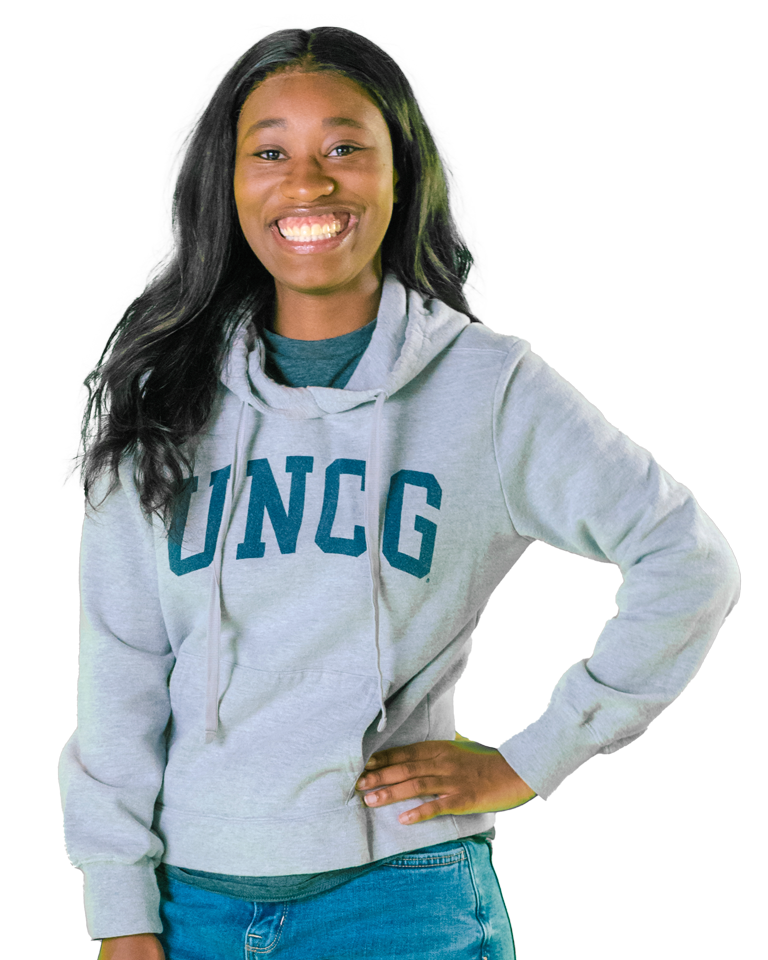
Alyssa
Year: Senior
Major: Public Health Education
Fun Fact: SGA Senator for the School of Health and Human Sciences. Has worked as a peer success coach on campus.
One of the main reasons I chose this school was because of the diversity. ultimately I wanted to go to a school that looks like the real world.
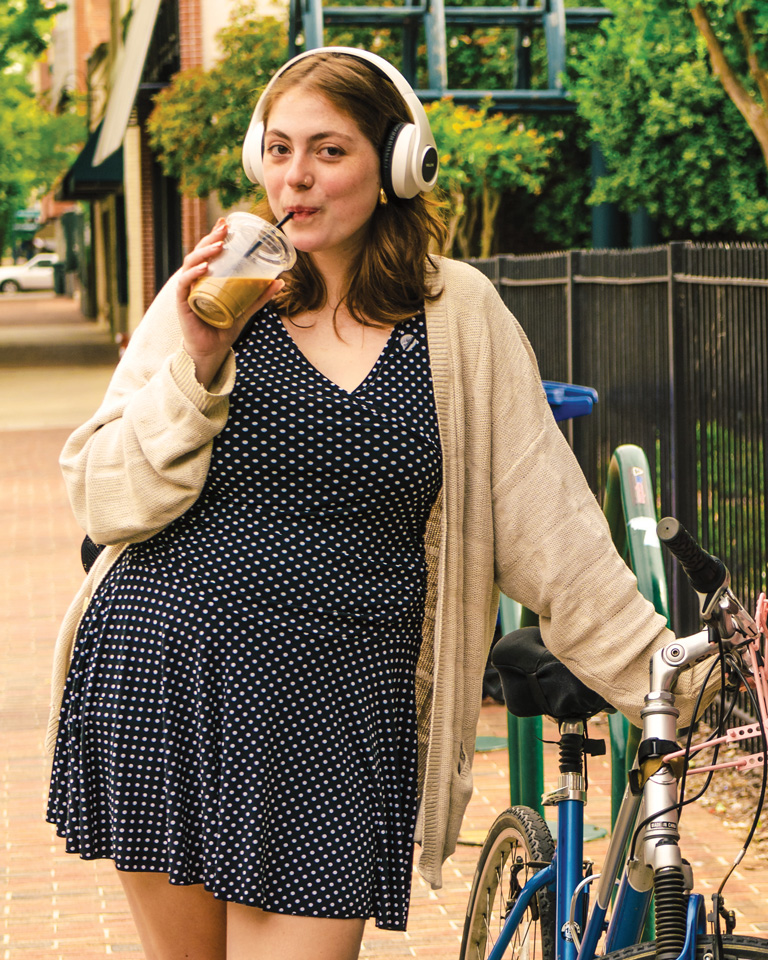
Claudia
Year: Senior
Major: Women’s, Gender, and Sexuality Studies and History with a focus on public history
Fun Fact: Was an intern at the GSO Historical Museum in Summer 2023. Runs the Open Closet for students, housed in the WGSS student lounge
I like the downtown community specifically. Everywhere I go, I see people I know.
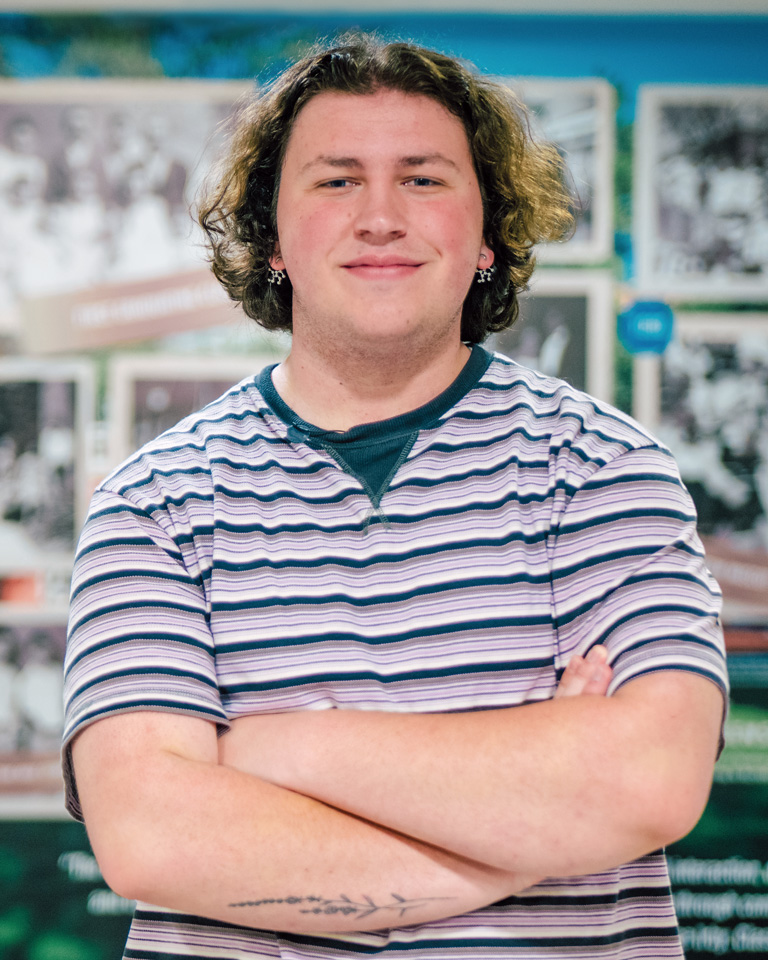
Ivan
Year: Junior
Major: Communication Studies
Fun Fact: Is an intern and student mentor in UNCG’s Communications and Community class. Lives in Gray Hall, the same dorm that his mother and sister – both alumnae – lived in.
At UNCG, everyone has their own sense of style. It’s not a one-size-fits-all.
Paying Their Way
3/4
More than 3/4 of UNCG students work on or off campus.*
30+
Over 1/3 work 30+ hours per week in a combination of on/off campus employment.*
65%
65% of bachelor’s degree recipients borrow some amount of money.†
20K
UNCG bachelor’s recipients who are in-state borrowers graduate with an average federal debt of more than $20,000.†
*Source: 2023 iBelong Survey. †Source: UNC System DataMart, Fall 2022 census snapshot.
Follow Me!
Follow UNCG students for a day in their life at college in Greensboro!